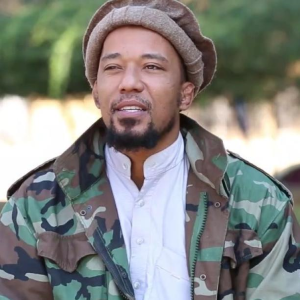Mohammed Haydar Zammar is a Syrian-German militant who served as an important al-Qaida recruiter, and is currently a member of the Islamic State. He claims to have recruited many of the organizers of the September 11, 2001, attacks. He was detained in Far'Falastin. A video believed to be taken in early 2014 places him listening to a speech by Abu Ali al-Anbari, the number two in the Islamic State, in Aleppo, Syria.
Jean-Charles Brisard is a French international consultant and expert on terrorism.

Jihadism is a neologism for militant Islamic movements that are perceived as existentially threatening to the West. It has been applied to various insurgent Islamic extremist, militant Islamist, and terrorist individuals and organizations whose ideologies are based on the Islamic notion of jihad. It has also been applied to various Islamic empires in history, such as the Umayyad Caliphate and the Ottoman Empire, who extensively campaigned against non-Muslim nations in the name of jihad.

The Islamic State (IS), also known as the Islamic State of Iraq and the Levant (ISIL), the Islamic State of Iraq and Syria (ISIS) and by its Arabic acronym Daesh, is a transnational Salafi jihadist group and a former unrecognised quasi-state. Its origins were in the Jai'sh al-Taifa al-Mansurah organization founded by Abu Omar al-Baghdadi in 2004, which fought alongside al-Qaeda during the Iraqi insurgency. The group gained global prominence in 2014, when its militants successfully captured large territories in northwestern Iraq and eastern Syria, taking advantage of the ongoing Syrian civil war. By the end of 2015, it ruled an area with an estimated population of twelve million people, where it enforced its extremist interpretation of Islamic law, managed an annual budget exceeding US$1 billion, and commanded more than 30,000 fighters.
Saraqib is a city in northwestern Syria, administratively belonging to the Idlib Governorate, located east of Idlib. During the course of the Syrian Civil War, the city fell into rebel forces in 2012 and was recaptured by the Syrian Army in 2020.

Alms for Jihad: Charity and Terrorism in the Islamic World is a 2006 book co-written by American authors J. Millard Burr, a former USAID relief coordinator in Sudan, and historian Robert O. Collins which discusses the role of Islamic charities in financing terrorism.
Bosnian mujahideen, also called El Mudžahid, were foreign Muslim volunteers who fought on the Bosnian Muslim side during the 1992–95 Bosnian War. They first arrived in central Bosnia in the latter half of 1992 with the aim of helping their Bosnian Muslim co-religionists in fights against Serb and Croat forces. Initially they mainly came from Arab countries, later from other Muslim-majority countries. Estimates of their numbers vary from 500 to 6,000.
Mujahideen, or Mujahidin, is the plural form of mujahid, an Arabic term that broadly refers to people who engage in jihad, interpreted in a jurisprudence of Islam as the fight on behalf of God, religion or the community (ummah).

Salafi jihadism, also known as revolutionary Salafism or jihadist Salafism, is a religious-political Sunni Islamist ideology that seeks to establish a global caliphate, characterized by the advocacy of "physical" (military) jihadist attacks on non-Muslim targets. The Salafist interpretation of sacred Islamic texts is "in their most literal, traditional sense", which adherents claim will bring about the return to "true Islam".
From the time of Muhammad, the final prophet of Islam, many Muslim states and empires have been involved in warfare. The concept of jihad, the religious duty to struggle, has long been associated with struggles for promoting a religion, although some observers refer to such struggle as "the lesser jihad" by comparison with inner spiritual striving. Islamic jurisprudence on war differentiates between illegitimate and legitimate warfare and prescribes proper and improper conduct by combatants. Numerous conquest wars as well as armed anti-colonial military campaigns were waged as jihads.

Denis Mamadou Gerhard Cuspert, also known by his stage name Deso Dogg and his nom de guerreAbu Talha al-Almani, was a German rapper who became a member of the Islamic State.

Harakat Ahrar al-Sham al-Islamiyya, commonly referred to as Ahrar al-Sham, is a coalition of multiple Islamist units that coalesced into a single brigade and later a division in order to fight against the Syrian Government led by Bashar al-Assad during the Syrian Civil War. Ahrar al-Sham was led by Hassan Aboud until his death in 2014. In July 2013, Ahrar al-Sham had 10,000 to 20,000 fighters, which at the time made it the second most powerful unit fighting against al-Assad, after the Free Syrian Army. It was the principal organization operating under the umbrella of the Syrian Islamic Front and was a major component of the Islamic Front. With an estimated 20,000 fighters in 2015, Ahrar al-Sham became the largest rebel group in Syria after the Free Syrian Army became less powerful. Ahrar al-Sham and Jaysh al-Islam are the main rebel groups supported by Turkey. On 18 February 2018, Ahrar al-Sham merged with the Nour al-Din al-Zenki Movement to form the Syrian Liberation Front.

Foreign fighters have fought on all four sides of the Syrian Civil War, as well both sides of the War in Iraq. In addition to Sunni foreign fighters, Shia fighters from several countries have joined pro-government militias in Syria, leftist militants have joined Kurdish forces, and other foreign fighters have joined jihadist organizations and private military contractors recruit globally. Estimates of the total number of foreign Sunnis who have fought for the Syrian rebels over the course of the conflict range from 5,000 to over 10,000, while foreign Shia fighters numbered around 10,000 or less in 2013 rising to between 15,000 and 25,000 in 2017.
There has been an increase in incidents involving alleged radical Islamism in the Balkans since the 1990s.
Khalid Mustafa Khalifa al-Aruri, known as Abu al-Qassam, was a Palestinian-Jordanian Islamic militant and a member of al-Qaeda who was the leader of the Guardians of Religion Organization.
Bajro Ikanović is a Bosnian Islamist, terrorist, and senior commander in the Islamic State in Syria and Iraq.
The Multikulturhaus in Neu-Ulm was a cultural centre run by the Multikulturhaus e. V., a registered association. On 28 December 2005 it was shut down by the Bavarian Ministry of the Interior. The land, the building and monetary funds were confiscated by authorities.

Foreign fighters in the Syrian civil war have come to Syria and joined all four sides in the war. In addition to Sunni foreign fighters arriving to defend the Islamic State of Iraq and the Levant or join the Syrian rebels, Shia fighters from several countries have joined pro-government militias in Syria, and leftists have become foreign fighters in the Syrian Democratic Forces.






